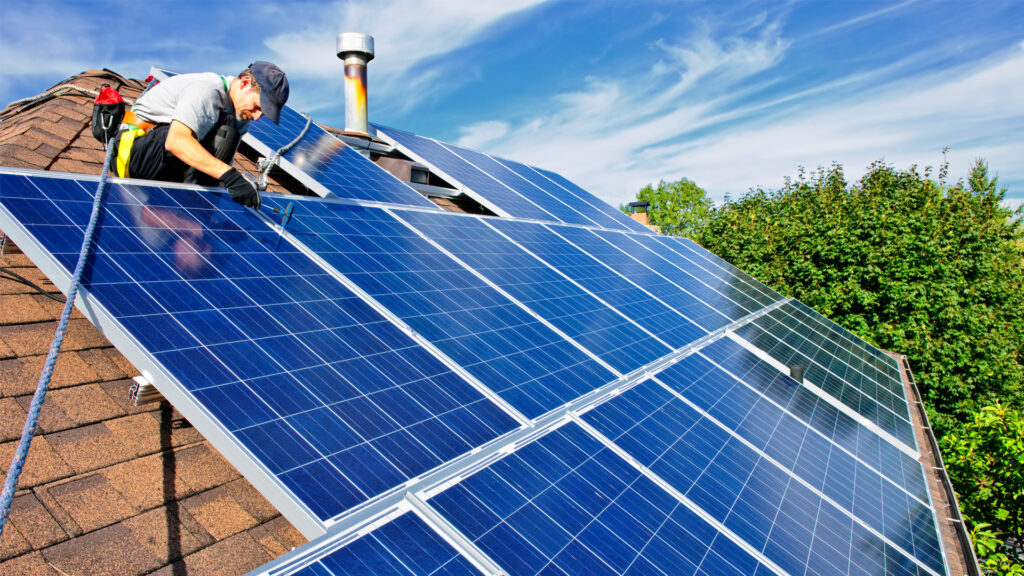By Jim Carroll
President Donald Trump wants to “unleash” fossil fuel energy, and put the brakes on climate technologies such as solar and wind energy and electric vehicles (EVs). He’s reversing most Biden-era climate-change policies.
Energy, of course, is key to a strong economy, and Trump says he wants a stronger one. As it turns out, possibly the best opportunity to strengthen the economy lies in the climate technology industry.
Trump won’t buy that, of course, and likely won’t let Congress, which is under his thumb. But it’s true — particularly in Florida, which ranks third in solar jobs and third in total clean energy employment.

Since 2023, solar and wind combined have added more new energy to the global mix than any other source, including oil and coal. Huge demand for solar, wind, EVs and other climate technologies has made climate tech just about the fastest-growing industry on the planet. Ever-dropping costs and the worldwide commitment to the industry are turbocharging the growth.
Annual climate industry investment globally hit $2.1 trillion in 2024. It’s expected to grow exponentially through 2030 according to the International Energy Agency and quadruple by 2035, according to a Bloomberg analysis.
Trump says climate change is a hoax. But money is money. (He appreciates money, right?) There are piles of it to be made in the climate industry.
American companies in the climate industry, including those in Florida, can earn large profits, add hundreds of billions to the economy and create nearly a million American jobs annually for the next 10 years — a win-win-win.
Going whole hog in the climate industry doesn’t mean abandoning fossil fuels. Not at all. We’ll need them for many years to come.
Nevertheless, the climate industry is a gold mine that we need to start tapping. As things now stand, we’re going to lose out, or at least be slowed way down.
China controls about 80% of the world solar market, 65% of wind and 60% of EVs. The U.S. doesn’t need to try to supplant China as the climate industry’s 800-pound gorilla. That’s not possible any time soon. We just need to get serious. The potential global market for solar panels, EVs, batteries and wind turbines is immense and just waiting for us to swoop in and take a good-sized chunk. Under Trump 2.0, we probably won’t.
China’s current dominance isn’t a given going forward. Its overall economy is down (nearly 20% of China’s young people are out of work). For years, China has relied on its relative economic prosperity to help finance its climate-tech push. But that prosperity is history.
It’s a perfect time for the U.S. to start catching up.
To start challenging China, we need to maintain the climate industry incentives in the Biden-era Inflation Reduction Act (IRA) and institute more of them. Instead, Trump is blocking their implementation. This is especially bad news in Florida.
Thanks in large part to the IRA’s tax breaks on American-made climate tech products, from 2021 through May 2024, climate investments totaling $488 billion have been made by the American private sector in 164 American factories (80% in Republican states). The tax breaks would help American manufacturers scale up and compete. But with Trump’s overt hostility to all things IRA, scale-up is unlikely.
The current $7,500 tax credit that American EV buyers get also needs to be kept. Hundreds of billions in EV manufacturing investments have been made by American companies including General Motors, Ford and Chrysler, especially in low-cost EVs to compete with the heavily subsidized, fire-sale-priced Chinese models. Yet Trump is demanding that Congress ax the EV tax credit.

In addition to incentives to manufacturers and consumers, solar and wind permitting need to be simplified, and the current freezes on permitting ended. One of Trump’s Day 1 executive orders proposed speeding up permitting on nuclear power and hydropower as well as fossil-fuel sources. Solar and wind need to get their permitting speeded up, too. However, that’s a pipe dream at this point.
The whole world except us has committed to the climate industry and, in the process, much of the world is becoming more and more reliant on China.
Were the U.S. to claim its share of the climate industry pie, U.S. businesses could make substantial profits and create millions of jobs, our global political influence would increase and we might even save the planet.
Now, not likely.
Jim Carroll is a West Palm Beach attorney, former U.S. House staff member and freelance columnist. This opinion piece was originally published by the Sun Sentinel, which is a media partner of The Invading Sea. Banner photo: A worker installs solar panels (iStock image).
Sign up for The Invading Sea newsletter by visiting here. To support The Invading Sea, click here to make a donation. If you are interested in submitting an opinion piece to The Invading Sea, email Editor Nathan Crabbe at ncrabbe@fau.edu.



